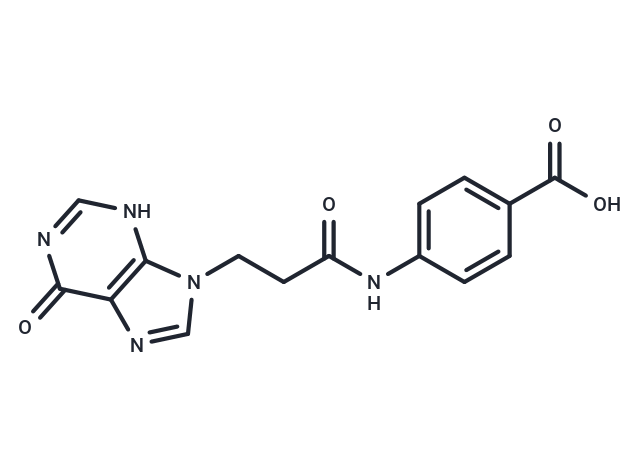Shopping Cart
- Remove All
 Your shopping cart is currently empty
Your shopping cart is currently empty

Leteprinim (AIT 082 acid) is an hypoxanthine derivative that stimulates in vitro neurite outgrowth and the production of adenosine and neurotrophins from astrocytes.

| Pack Size | Price | Availability | Quantity |
|---|---|---|---|
| 1 mg | $89 | In Stock | |
| 2 mg | $126 | In Stock | |
| 5 mg | $197 | In Stock | |
| 10 mg | $298 | In Stock | |
| 25 mg | $476 | In Stock | |
| 50 mg | $678 | In Stock | |
| 100 mg | $912 | In Stock | |
| 200 mg | $1,220 | In Stock |
| Description | Leteprinim (AIT 082 acid) is an hypoxanthine derivative that stimulates in vitro neurite outgrowth and the production of adenosine and neurotrophins from astrocytes. |
| In vitro | Leteprinim stimulates the outgrowth of neurites from PC12 cells and neurons, stimulates the synthesis and/or release of neurotrophic factors from astrocytes, enhances nerve fibre regeneration in vivo, and enhances memory in animals and humans. Leteprinim also protects against glutamate neurotoxicity in vitro and in vivo, which has led to successful tests of Leteprinim in animal models of acute central nervous system injury[3]. |
| In vivo | Leteprinim (60 mg/kg/day; i.p., for 7 days, starting from 20 min before the kainate injection) did not modify the seizures caused by kainate but, like diazepam, it decreased kainate-induced mortality, the reduction of GAD activity, and the loss of hippocampal neurons in rats[2]. |
| Alias | AIT-082 acid, AIT082 acid, AIT 082 acid |
| Molecular Weight | 327.29 |
| Formula | C15H13N5O4 |
| Cas No. | 138117-50-7 |
| Smiles | C(CC(NC1=CC=C(C(O)=O)C=C1)=O)N2C3=C(C(=O)N=CN3)N=C2 |
| Relative Density. | 1.57 g/cm3 (Predicted) |
| Storage | Powder: -20°C for 3 years | In solvent: -80°C for 1 year | Shipping with blue ice. | |||||||||||||||||||||||||
| Solubility Information | DMSO: 12.5 mg/mL (38.19 mM), Sonication is recommended. | |||||||||||||||||||||||||
Solution Preparation Table | ||||||||||||||||||||||||||
DMSO
| ||||||||||||||||||||||||||

Copyright © 2015-2025 TargetMol Chemicals Inc. All Rights Reserved.